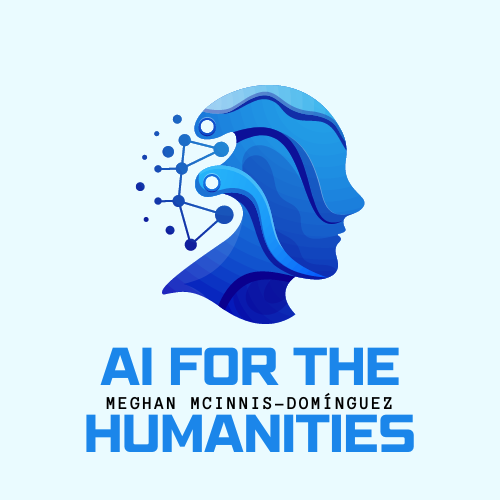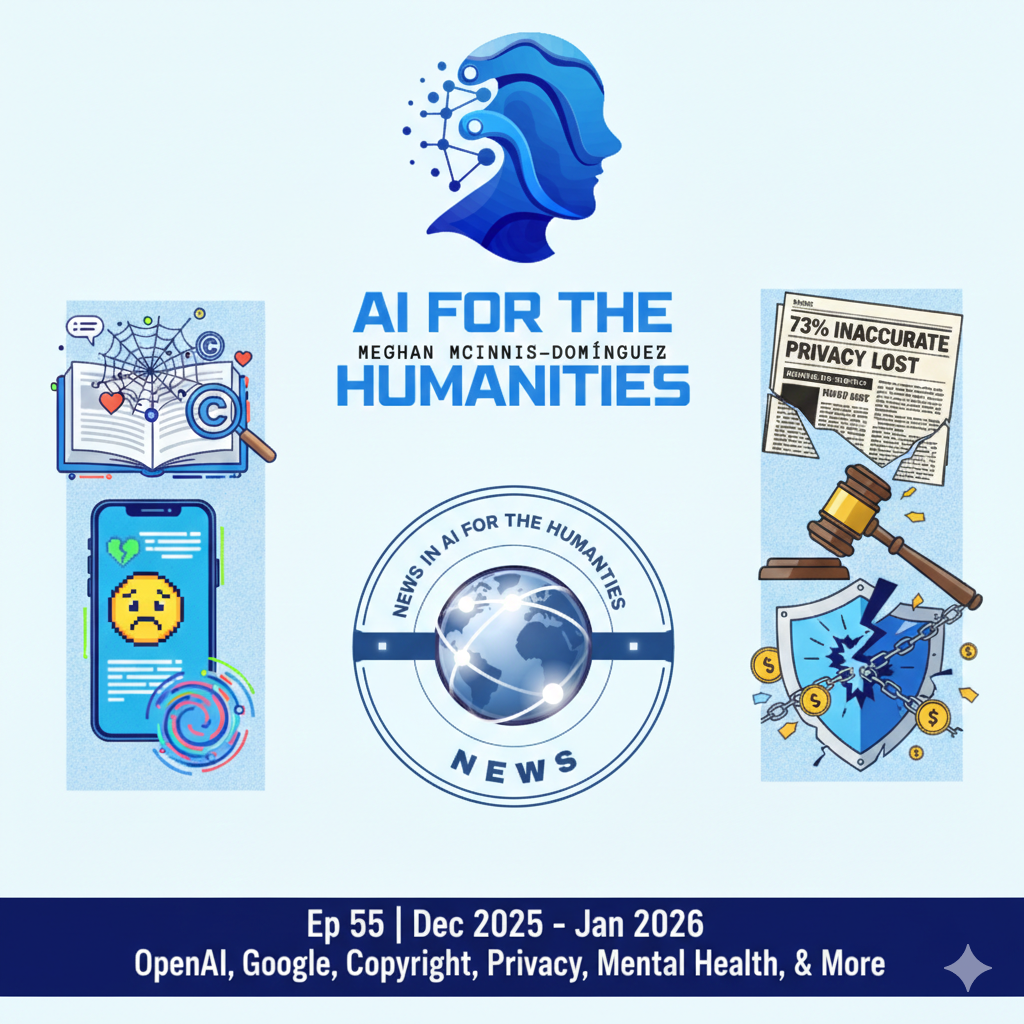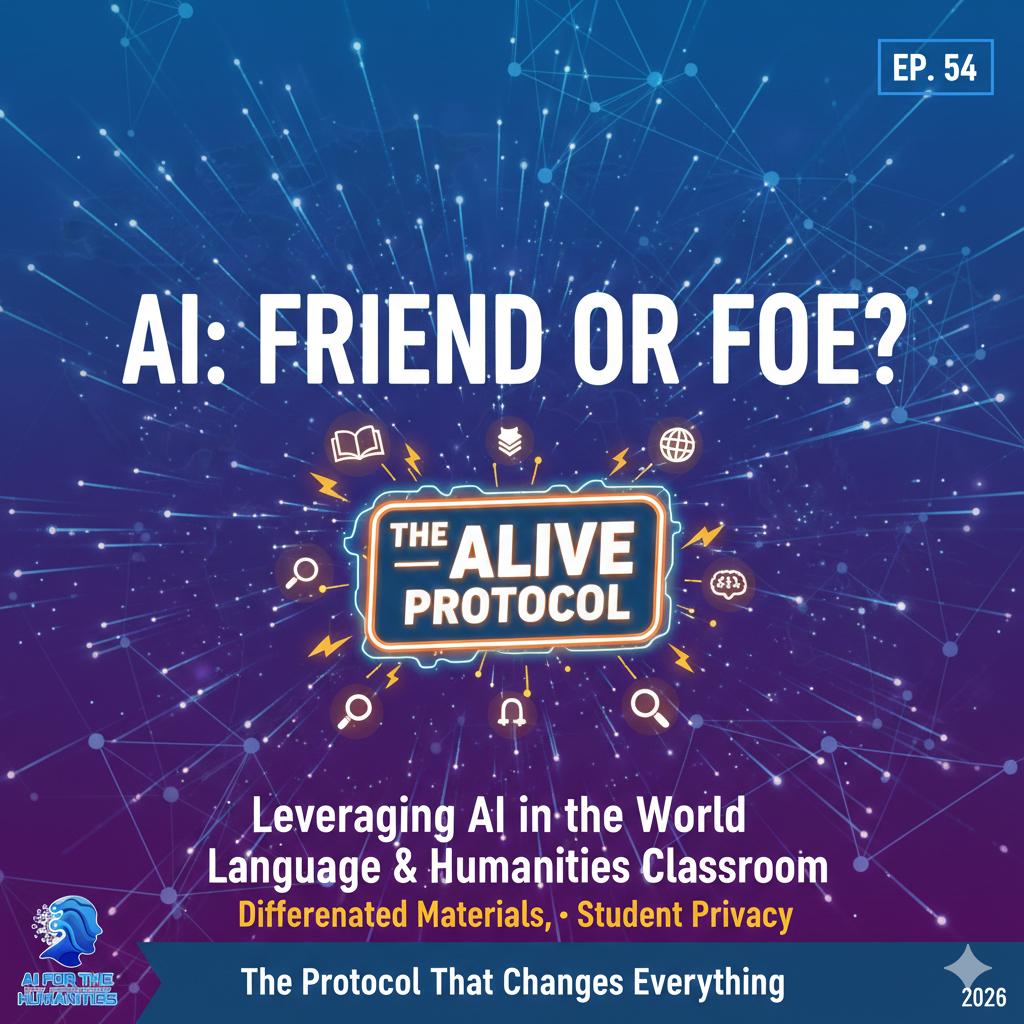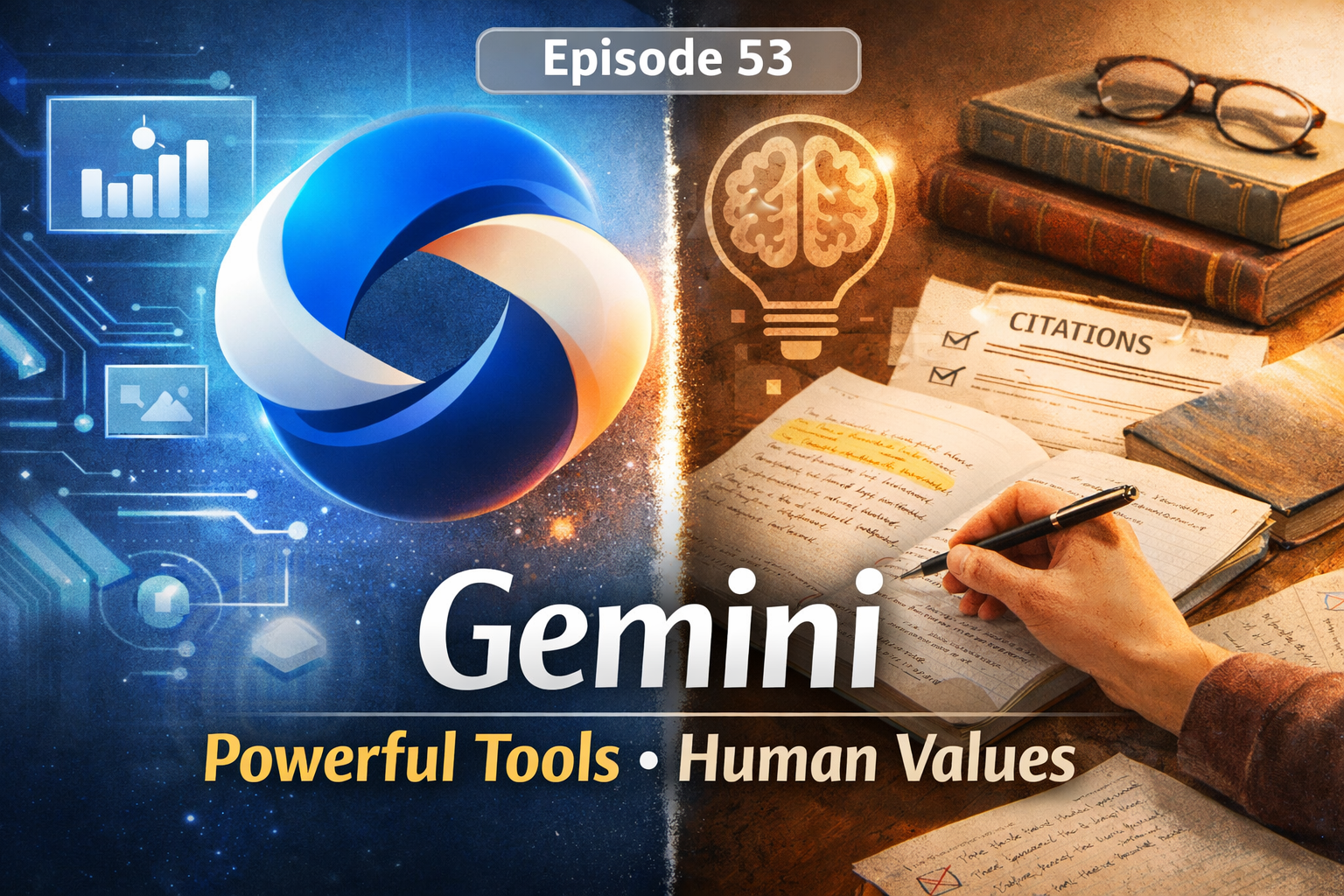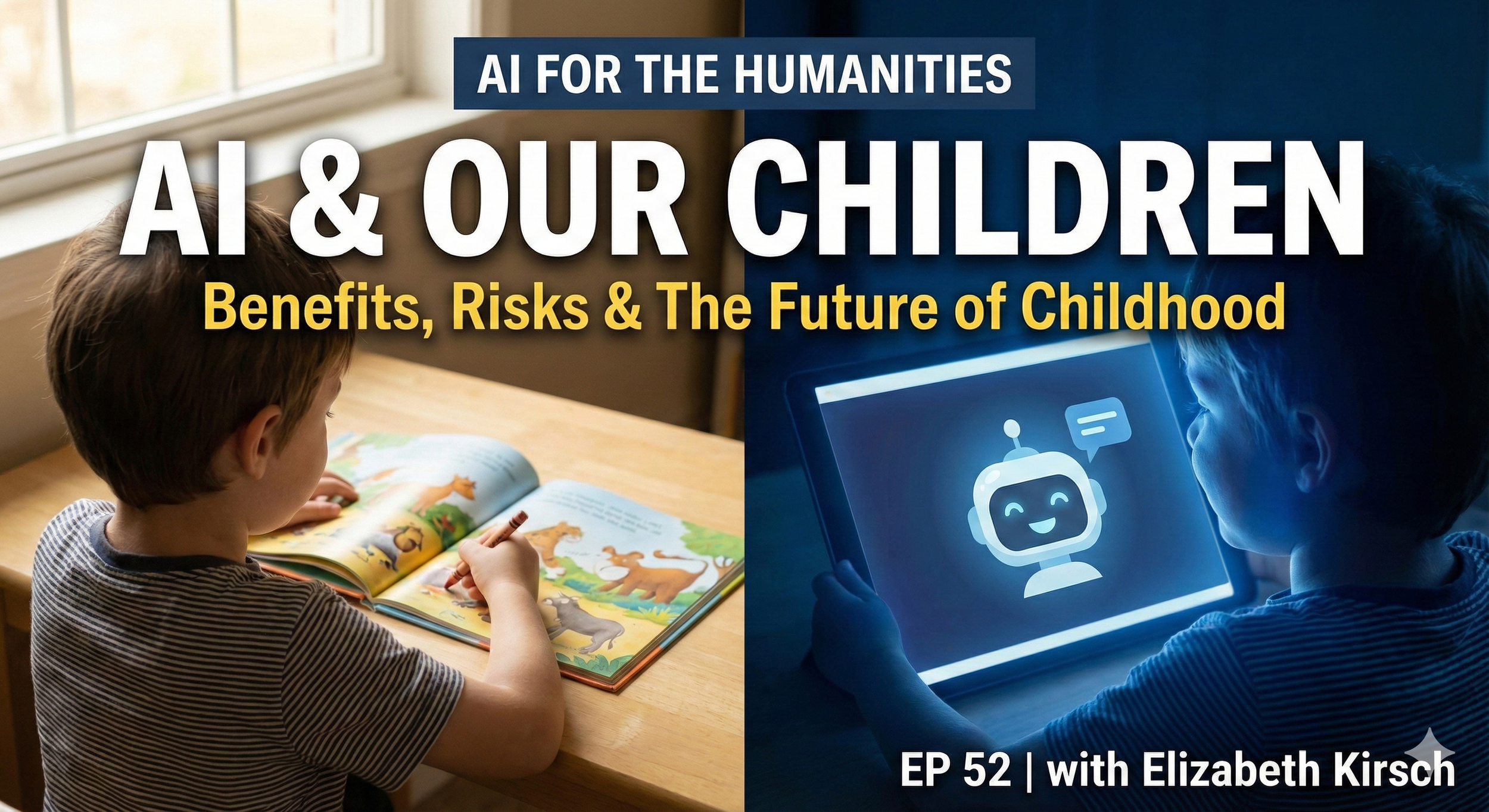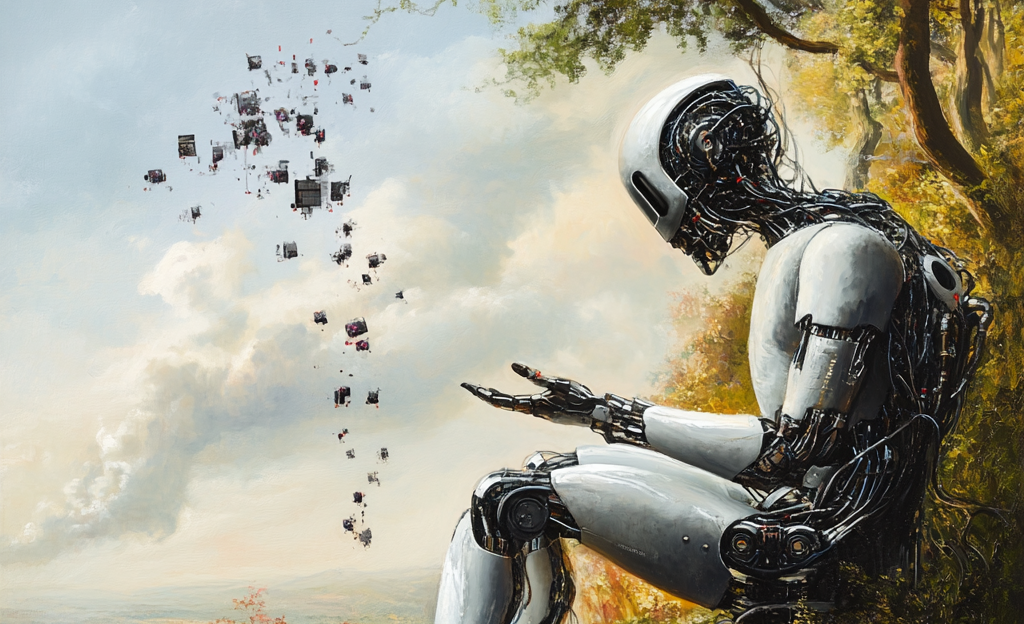
A YouTube Channel about how AI impacts the Humanities and the Humanities impact AI.
Latest Episodes
Stanford extracts 95% of Harry Potter from AI (verbatim!), Courts compel release of 20M ChatGPT logs, AI exaggerates research findings 73% of the time, Mental health crisis demands humanistic response
youtu.be/Kk2FN0y2Dws
Transform your humanities classroom with AI! Lauren Lamonsoff shares the ALIVE protocol—a practical framework for creating differentiated materials, assessments & feedback while protecting student privacy. Essential viewing for ALL humanities educators!
Deep dive into Google Gemini for humanities work! UD senior Catherine Komp demos Deep Research, custom Gems & image analysis—plus crucial guidance on ethics, bias & citation. https://youtu.be/OUFEQ83OCZs
How is AI affecting our children's development? Recent UD grad Elizabeth Kirsch explores ChatGPT's impact on young minds—from personalized learning benefits to risks of addiction, grooming & eroded human connection. https://youtu.be/K8vd2C1VdX0
November 2025 was the most intense month in AI since ChatGPT launched. New episode of AI for the Humanities covers:
• GPT-5.1's controversial "warmer" personality
• Gemini 3's record-breaking 1501 Elo score
• Nano Banana Pro's troubling watermark system
• Chinese hackers using Claude for cyberattacks
• $650B in new infrastructure investments
• Why humanities perspectives are more crucial than ever
https://youtu.be/algk3QP8XjE
Grace Gulick (CS + Art major at UD) breaks down MidJourney—the creative possibilities, the copyright mess, and why prompt engineering actually matters. AI image generators aren't disappearing, so how do we use them without screwing over artists?
Exploring Grok's potential for humanities education—from image analysis to deep research. But are we critically examining the biases & Western-centric perspectives these AI tools bring to our classrooms? New video diving into both the promise & pitfalls. 🤖📚
AI is becoming infrastructure, not tool. From Pulse organizing your day before you ask, to Comet completing assignments in Canvas, to Chrome embedding Gemini invisibly—the question shifts from "should students use AI?" to "how do we teach when AI is always present?" New episode explores what this means for humanities education.
How does Microsoft Copilot handle cross-cultural research? Criminal Justice major Ajah Edwards demonstrates translation and analysis tools while tackling the ethics of AI bias, documentation, and preserving community voices in digital heritage work.
In episode 46 of AI for the Humanities, research assistant Emilia Cortale returns to test Llama 3.3 (Meta’s open-source LLM) on Plácido’s “La flor de la caña,” then unpacks what AI-assisted reading means for the Humanities: access vs. depth, dialect and historical nuance, hallucinations, authorship, and ethics in education and the environment. Practical guardrails included: prompt documentation, source verification, dialect awareness, and sustainability reflection.
Episode 45 of News in AI for the Humanities (July-August 2025) is live: “Ambient AI” is here—GPT-5, GPT-OSS open weights, Gemini Deep Think, Google AI Mode/Canvas, NotebookLM, agentic browsers, deepfake risks, publisher traffic shocks & the White House AI plan. Classroom takeaways inside. https://www.youtube.com/watch?v=wc4-M6GFRAk #AIHumanities #AmbientAI #DigitalLiteracy
Our student interns reflect on their semester working with AI tools in humanities contexts. Honest assessments of what works, what doesn't, and what they learned along the way. https://youtu.be/qbA8-AgvdZg #AIHumanities #StudentVoices #EducationTech
From grant writing to parenting advice? Claude is pushing the boundaries. In this follow-up video, Riley Bell returns to explore Claude’s new features, raise ethical concerns, and reflect on the AI-human divide. A must-watch for educators.
Explore the latest AI developments reshaping Humanities education and how the Humanities can shape AI! This episode covers Generative AI news since June 2025.
Our new episode explores AI's transformative impact on humanities education by covering the latest AI news (June-July 2025) and how it relates to Humanities education: https://youtu.be/56Akx6KbIb8 #AIInHumanities #EdTech #DigitalHumanities
From poetry to songs, explore how Creative AI enhances literary studies in the Hispanic literature classroom! Discover pedagogical insights, ethical discussions, and creative engagements with Plácido & Rubén Darío. https://youtu.be/3jCx4SseGrI #CreativeAI #HispanicLit #AIforEducation
Curious how AI imagines justice, empathy, or freedom? Cognitive Science major Sarveen Talaminai explores Flux.1, a powerful image generator, and its cultural & ethical challenges—from realism to representation. https://youtu.be/i-D6gQXH1g8 #AIethics #DigitalHumanities #GenerativeArt
New video! Odalys Nuñez dives into ChatGPT’s limits as a translator & explores its environmental footprint and ethical implications for language and the arts. A must-watch for Humanities educators! Watch here: https://youtu.be/hUL35NNXNdo #AIforEducation #ChatGPT #DigitalHumanities
How does Google Gemini compare to ChatGPT, Claude, and Copilot? Can it revolutionize humanities research? Catherine Komp explores features, updates, and real-world student uses in this accessible deep dive. https://youtu.be/jRqtObca__g #GoogleGemini #AIforStudents #HumanitiesAI
Generative AI is transforming humanities education! Discover the latest tools from Anthropic, Amazon, Midjourney, Google, Suno & more, reshaping teaching, research, and creativity. Watch now! #AIHumanities #GenerativeAI #EdTech
What is ChatGPT? How does it work? What does it mean for education, ethics & the humanities? In this sharp & accessible video, Elizabeth Kirsch unpacks the tech, tackles the concerns, and shows what it can—and can’t—do for educators. https://youtu.be/NJ5ZJvUgw-I #AIliteracy #ChatGPT
GPT‑4 o gets chatty, Gemini 2.5 “thinks,” Veo 2 films, MusicLM jams, Meta drops Llama 4, and the White House orders AI‑literacy for every classroom. Spring 2025 has been wild—here’s what it means for the humanities: https://youtu.be/cCghtEPFQVI#GenerativeAI #AIinEducation #Humanities
New episode! UD student Grace Gulick explores MidJourney—an AI image tool that mimics classic art styles. Can it rival the Renaissance? Or is it missing the human spark? Explore this blend of code and creativity. https://youtu.be/B7oZ10dgeaQ #AIandArt #MidJourneyAI #AIForTheHumanities
In this episode of AI for the Humanities, University of Delaware intern Logan Elkins explores Grok, the headline-making large language model developed by Elon Musk’s company, xAI. Logan breaks down what Grok is, how it integrates with X (formerly Twitter), and highlights some of its most notable features, including the “DeepSearch” function, image generation through its Aurora model, and a wide range of quirky personas.
https://youtu.be/B7oZ10dgeaQ#AIandArt#MidJourneyAI#AIForTheHumanities
In today’s AI for the Humanities, UD student Ajah Edwards explores Microsoft Copilot’s power to boost creativity, productivity & cultural preservation. She also flags key concerns: bias, ethics & authenticity. #AIAndHumanities #MicrosoftCopilotInAction
In this episode, Emilia Cortale presents her research on Meta’s Llama 3.3 model. Emilia highlights Llama 3.3’s open-source nature, high efficiency, and multilingual applications, while also exploring its role in language learning.
In this episode of AI for the Humanities, intern Riley Bell introduces Claude 3.7 Sonnet, demonstrating Claude’s interface, capabilities with Google Drive and code rendering, and its use in linguistics and writing.
In our latest AI for the Humanities episode, MA student Elizabeth Kirsch breaks down ChatGPT-4o—how it works, what it means for education, and why ethics & human insight still matter. Don’t miss this thoughtful take!
AI is rapidly reshaping creativity, culture, and society. Join us to explore the latest developments and their critical implications for the humanities. New episode out now! #AIForHumanities #AIEthics #HumanitiesInTech
Check out the intern roundtable! In this episode of AI for the Humanities, Meghan McInnis-Dominguez introduces a new cohort of undergraduate interns who will explore Generative AI tools and their educational applications in the humanities.

Meghan McInnis-Domínguez, Associate Professor of Spanish at the University of Delaware, specializes in subjects ranging from Pre-Columbian poetry to contemporary Latin American short stories. Her research explores current media trends and emerging technologies, including social media platforms as well as Generative AI tools. Through her teaching, she emphasizes guiding students to engage with modern technologies responsibly—leveraging them to deepen their understanding of Hispanic literature while developing transferable skills essential for success in an evolving, technology-driven workforce.
